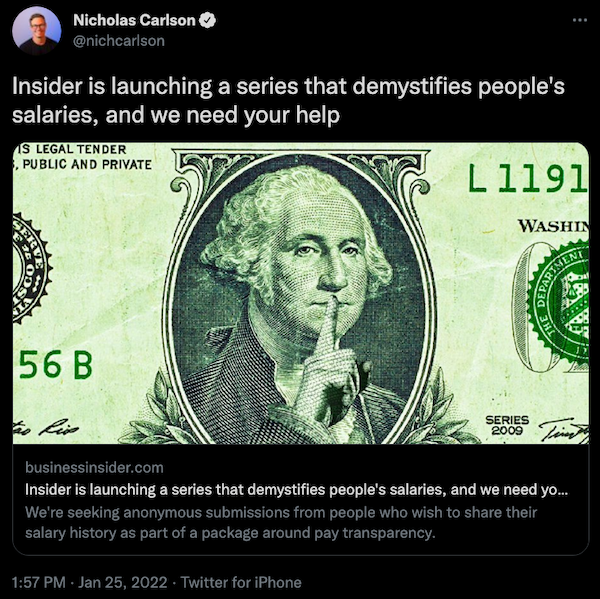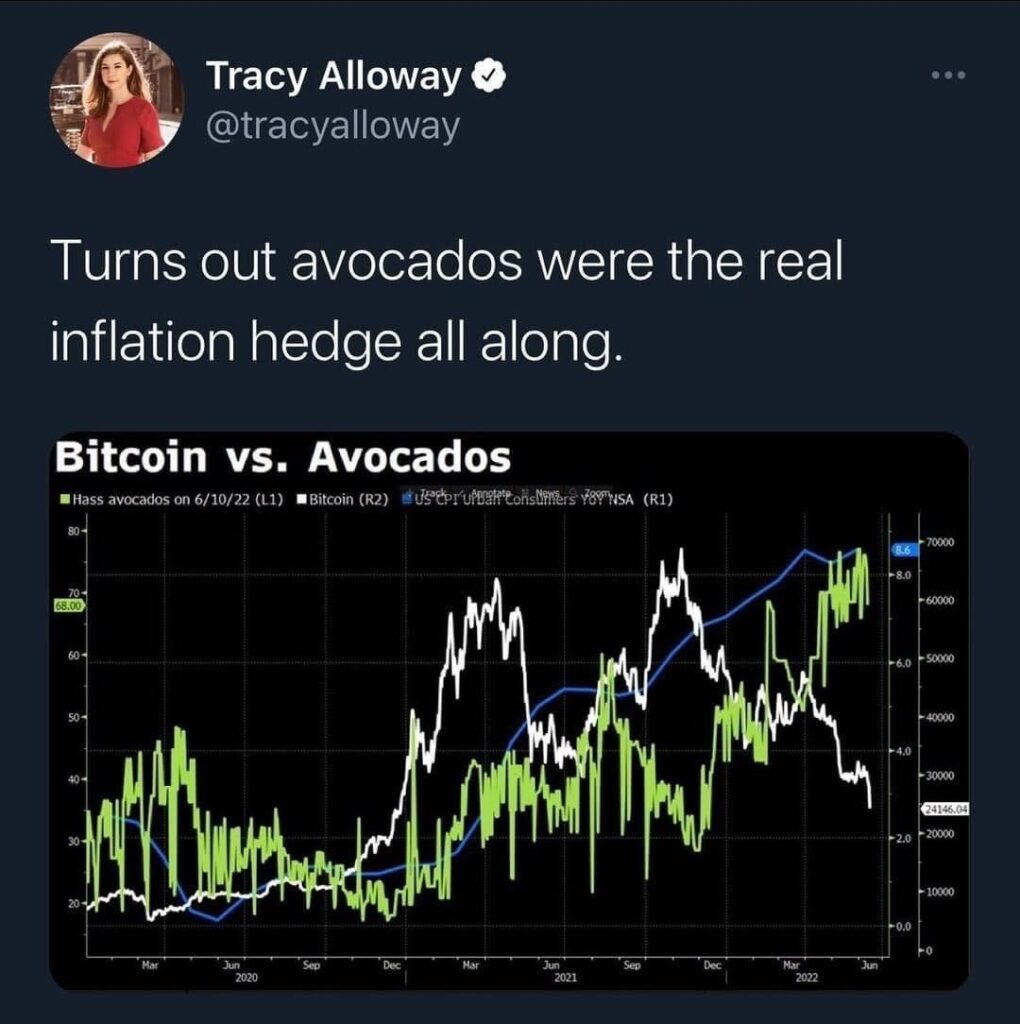
Category: Money
In this video posted on Reddit’s “WallStreetBets” subreddit, you can see a cabbie who knows how to make the most of every moment. While at a red light, he’s on a tablet trading Bitcoin.
Consider the risks involved:
- Using a tablet while driving…
- in Montreal (the street signs and billboard with “A LOUER” — which means “FOR RENT” — and a 415 area code)…
- and trading Bitcoin…
…this cabbie loves to live dangerously! I wish him lots of luck.
Nicholas Carlson, Global Editor-in-Chief of Business Insider, announced on Twitter that they were doing a series of articles that “demystifies people’s salaries” and asked people to report theirs.
Someone asked the inevitable question, and got a sadly unsurprising answer…

…and they’ve been roasting him ever since then:



The article does say at the beginning that they’re asking for people to anonymously submit their salary history, but if you get to the instructions, you’ll see that they’re using the term “anonymously” to mean something different:
If you are interested in sharing your salary journey, please send an email to Chris Weller at cweller@insider.com with your name, age, occupation, and a description of your salary journey. (This will remain 100% confidential. No information will ever be shared publicly.)
They are asking you to submit your salary history along with information that identifies you. That’s not anonymous. If they follow through on the promise not to share the information publicly — a promise not backed by any kind of legal agreement, by the way — the information will be confidential. But it will not be anonymous. And it will be confidential only for as long as whoever manages Business Insider chooses to keep that non-legally-binding promise.
The Twitter thread is still going strong as I write this, and if you’re looking for an amusing diversion this fine Thursday, I heartily recommend this one.
How much is a billion?
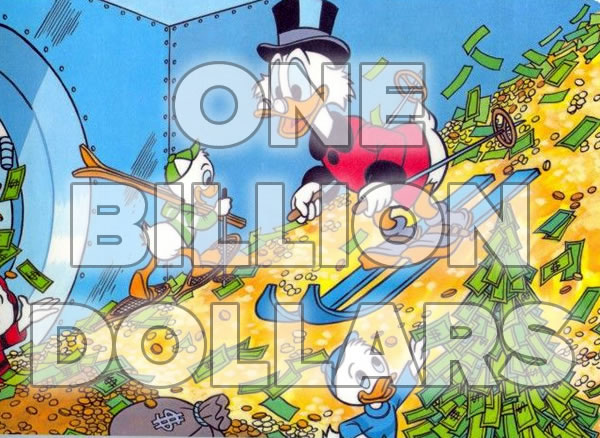
 Michael Bloomberg has made a lot of news lately, partly for his failed bid to become the Democratic Party’s presidential candidate, but mostly for the amount of money he spent on that bid: an estimated 1.2 billion dollars. You shouldn’t feel too bad for him: His estimated net worth is over $55 billion, and if even only 2% of that is liquid, that’s still 1.1 billion dollars.
Michael Bloomberg has made a lot of news lately, partly for his failed bid to become the Democratic Party’s presidential candidate, but mostly for the amount of money he spent on that bid: an estimated 1.2 billion dollars. You shouldn’t feel too bad for him: His estimated net worth is over $55 billion, and if even only 2% of that is liquid, that’s still 1.1 billion dollars.
The problem with large numbers like one billion is that they’re a difficult concept for many people to wrap their head around. Lately, I’ve been blowing people’s minds with the example I’m about to show you.
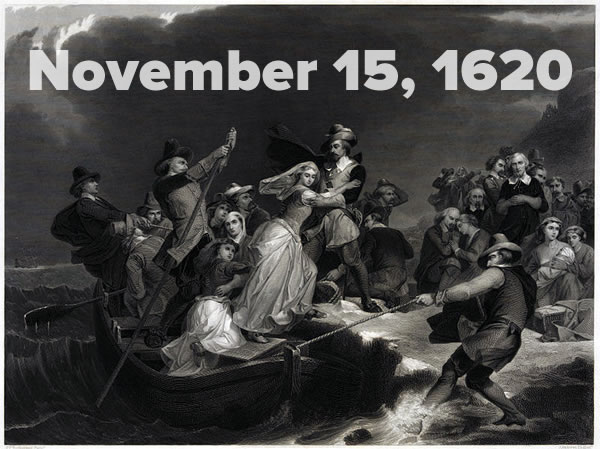
Suppose you’re an immortal being living in the city of Leiden in the Netherlands during the summer of 1620. It’s a pretty happening place — even back then, it had already been around nearly 800 years and a leading place of academia and science for almost half a century. Immortality has a few downsides, one of which is boredom, which you’re suffering from at the moment.
That’s when you hear some whispers in town. There’s a group of people who’ve chartered a ship with the auspicious name Speedwell to take them to them to a port city in England, join up with another ship, and then head to the New World to establish a colony. Finally, you think, something interesting.
You book passage on the ship, and after a harrowing voyage, which includes having to ditch the Speedwell because it’s unseaworthy and piling onto the other ship (the Mayflower), you sight what is now Cape Cod on November 9, 1620. You don’t actually make land for another two days.
After being cooped up on an overcrowded ship for over two months — and with a number of religious fanatics who would not shut up — you decided to enjoy some solitude and explore the woods by yourself. That’s when you find the magic dreamcatcher.

You know that it’s a magic dreamcatcher because the spirit living inside it says “Hey, dude, this is a magic dreamcatcher.” It also tells you that the magic in the dreamcatcher causes the piece of paper below to materialize in its “web” every morning at the moment of sunrise:
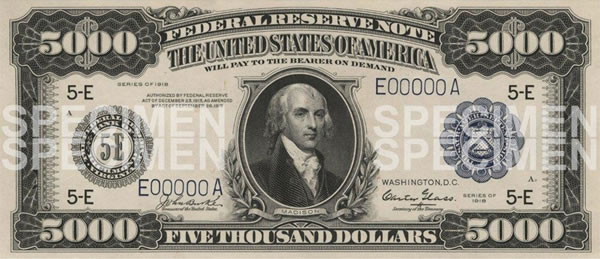
“Trust me,” the spirit says, “this will be actual currency someday.”
The spirit tells you that there’s a catch: as long as no one else sees the money that it magically creates, you’ll get a crisp new $5,ooo bill every morning. “Just stash it under a rock or something,” the spirit says, “and you’ll get a new one every morning. The moment someone else sees the money — and that includes investing it, or putting it in a bank, the magic stops.”
“At last!” you exclaim. “A way to make my fondest dream come true! I want to be…a billionaire!”
The spirit, being a money spirit, does some quick mental math and then says, “Good thing you’re immortal.”

You hang the dreamcatcher over your bed, and very next morning — November 15, 1620 — at the crack of dawn, you see a crisp $5,000 bill in its strings. You take the bill and put it in a safe hiding place. The next day, the same thing happens. And the next day, and the next day, and the next day…
Centuries pass, and finally, it’s today: Tuesday, April 21, 2020. You’ve been collecting 5 grand a day since Plymouth Rock.
Here’s the question: Have you collected a billion dollars yet?
(Scroll down for the answer.)

Between November 15, 1620 and April 21, 2020, a grand total of 145,889 days have passed. In that time, you’ve collected:
145,889 times 5,000 dollars, which makes $729,445,000.
729 and a half million dollars is a pretty nice sum, but it’s not even three-quarters of the way to a billion dollars.
What if you’d found the dreamcatcher a little sooner? How about over a hundred years earlier — say October 12, 1492, when Columbus made landfall in the Bahamas? You would’ve started accumulating bills 192,674 days ago, which means you’d have saved up $963,370,000. Not quite a billion, but close.
In fact, in order to be a billionaire today by putting away $5,000 each day without the money earning interest, it would take you 200,000 days to save up a billion dollars. You would have to start saving $5,000 a day starting a little over 20 years prior to Columbus’ landing: September 11, 1472.
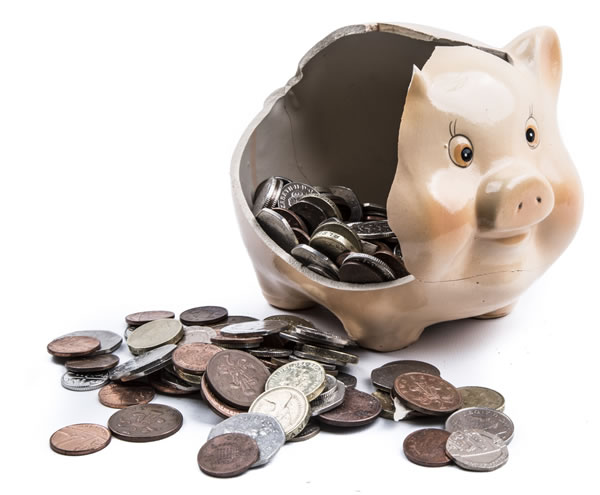
Chances are that you can’t put $5,000 a day — that’s $182,000 a year — into savings. Even if you had that sort of money after all the expenses that go into living, you definitely don’t have over 500 years to spare.
That’s how big a billion is.
Now remember that:
- Elon Musk has a net worth of $38 billion.
- Mackenzie Bezos has a net worth of $47.4 billion.
- Jim, Alice, and Robson Walton (as in Walmart) each have a net worth of about $54 billion.
- Warren Buffett has a net worth of $68 billion.
- Bill Gates has a net worth of $98 billion.
- And the richest man in the world, Jeff Bezos, has a net worth of $113 billion.
(It also means that the most likely path to becoming a billionaire isn’t through trading your time for money, but through capital gains.)


